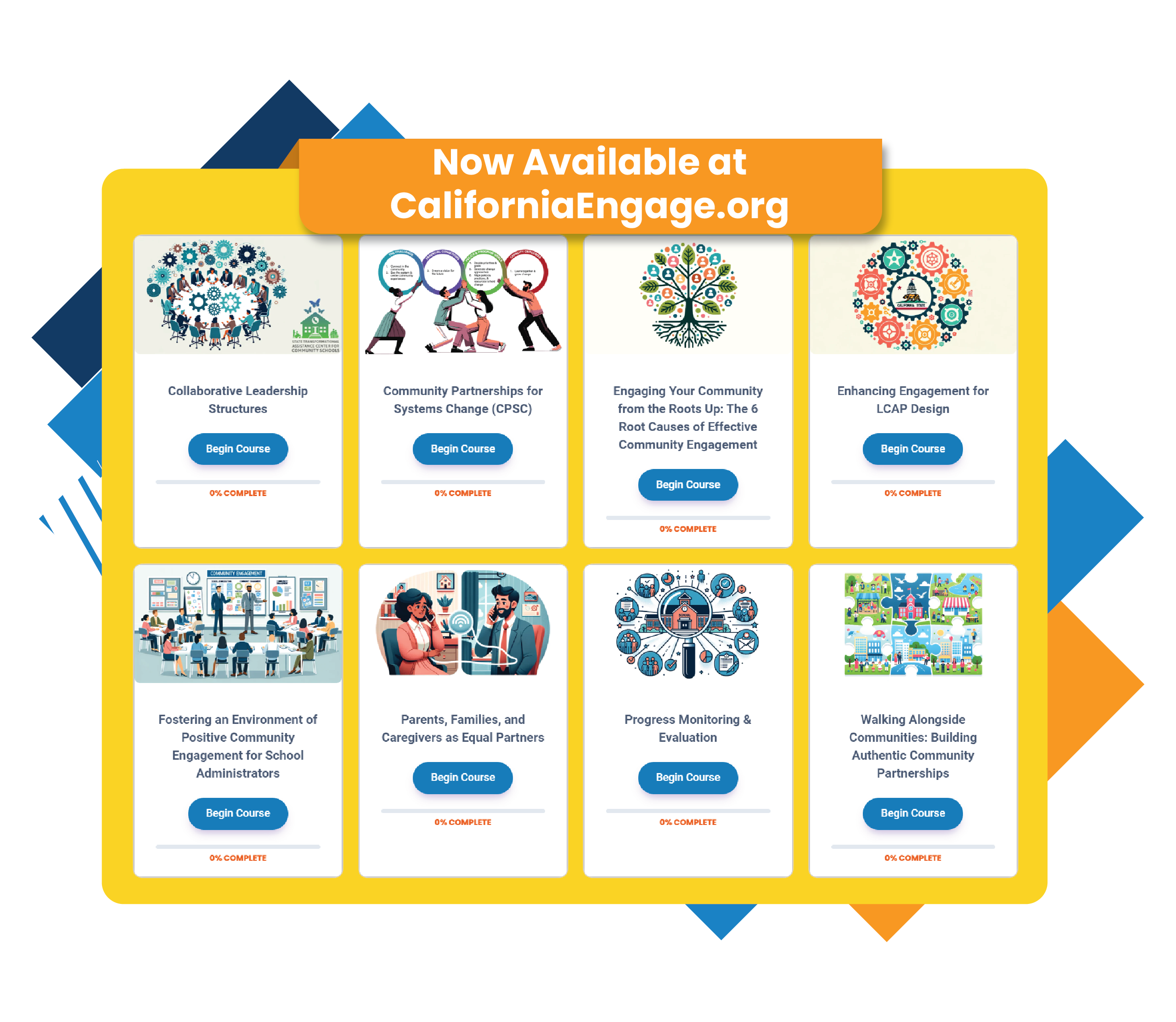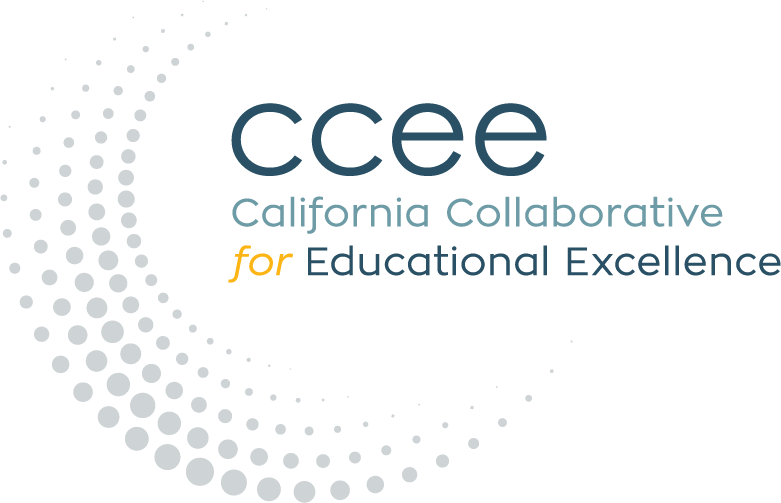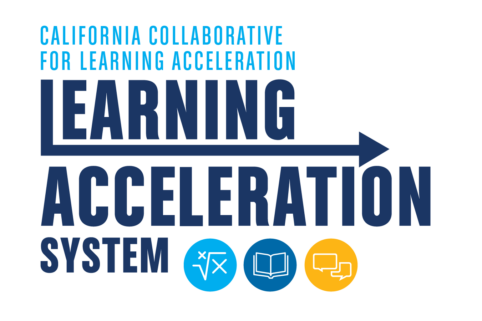Category: featured posts
New Podcast: Rising from the Margins
New! Statewide System of Support Directory
Hot Topics-Madera Unified Intensive Assistance Model
CCEE’s Hot Topics Blog Update: Madera Unified’s journey to implementing the Intensive Assistance Model of PLCs with the CCEE.
Featured Topic – This week Todd Lile, Superintendent of Madera Unified School District, and Adalberto Hernandez, Principal at Washington Elementary in Madera USD presented how their work has been progressing with the Intensive Assistance Model in partnership with CCEE. Washington Elementary School is one of 8 schools in 5 districts across the State engaged in this work. This work is focused on job-embedded coaching focused on developing Leadership, English Language Arts, Mathematics, English Language Development and PLCs with over 130 onsite coaching for teachers and leaders.
Statewide Context: This model has the potential to be a statewide professional development model for districts.
Call to Action: See the power point presentation from Principal, Adalberto Hernandez on how their school is using this model to track student performance and results.
If you have any questions about CCEE and how to engage with our resources and professional learning opportunities, please visit our website. Stay Ahead in Education! 📚 Check out our Friday 5! Join CCEE’s ListServ & Calendar Updates to Never Miss an Event. Sign Up Now for Limitless Learning Opportunities. 🌟 #CCEEConnections”
CCEE Connection (October 2023)
News & Announcements
Request for Proposals
- Proposals Accepted Through: October 30, 2023 at 4:00pm PST
Balanced Assessment System pilot
In January 2024, CCEE will be launching a Balanced Assessment System Pilot, where selected LEAs will pilot a micro-course and toolkit, designed to support them in creating balanced assessment systems. This opportunity is a right fit for LEAs wanting to conduct a review of their current assessment systems, especially if deciding whether to make further investments in interim and/or curriculum-embedded assessments.
Interested in learning more? Register for a virtual informational session on Monday, October 16 from 1-2pm PST. If you’re not able to make the informational session, the archived recording will be posted on CCEE’s website following the session.
Open Door Sessions
CCEE, in collaboration with LEAs and partner organizations, is hosting “Open Door” sessions to share best practices, tools/resources, and strategies to support student learning. These sessions provide opportunities for county office and/or district staff to listen and learn from other LEAs across the state.
Below are archived materials from past Open Door Sessions:
- Empowering Success: The Path of Transparency, Data-Driven Decisions, and Student Ownership (9/13/23)
Please check our Events Calendar or follow CCEE on Twitter and LinkedIn to stay up-to-date on upcoming Open Door sessions.
LEA Spotlights
The Spotlights Project aims to celebrate some of the innovative, inclusive, and shareable practices that LEA teams have implemented to improve outcomes for students across our state. Each Spotlight organizes the successes, challenges, and lessons learned in a way that calls attention to emerging practices, reproducible strategies, and applicable resources, in hopes of introducing accessible points of conversation for other LEAs looking to resolve similar issues.
Below are two recently published Spotlights. Click on the links below to learn more about the innovative practices taking place in these LEAs.

To recruit and retain a teacher workforce that better reflects their student population, Pittsburg USD employed a multi-pronged set of strategies anchored around collecting input and feedback from the broader school community, grounded in data, and focused on creating an inviting culture that celebrates the community and the students they serve.
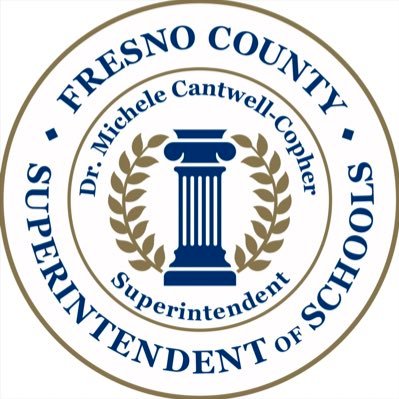
Fresno CSS sought to alleviate the burden on their LEAs that resulted from the influx of plans and deadlines in response to the pandemic and its relief efforts by rooting their work in improvement science to address a specific problem through smaller, measurable changes to make a meaningful impact.
About the I3 Center
The Innovation, Instruction, and Impact (I3) Center implements a statewide approach to improving LEA capacity by collaboratively developing, delivering, sharing, and spotlighting practices that have demonstrated the power to improve outcomes for students.
About the CCEE
The California Collaborative for Educational Excellence is a statewide leader delivering on California’s promise of a quality, equitable education for every student.
Executive Director’s Corner
Return on Investment (ROI) in Education
By Matt J. Navo, Executive Director

In 2021, in response to the needs created by the COVID-19 pandemic, the State Legislature funded Assembly Bill (AB) 86. The purpose of AB 86 was to provide support to local educational agencies (LEAs) in maximizing positive pupil outcomes and most effectively using funds. Basically, maximize the most effective use of funds to support students and see a return on investment (ROI).
CCEE is responsible for providing support to LEAs in maximizing positive pupil outcomes with the most effective use of funds to implement learning recovery programs. We do this by designing and implementing initiatives that explore problems of practice and emerging/best practices in the field to develop and share high quality, relevant, and usable lessons learned to support sustained improvement for students by June 30, 2024.
Under the direction of Sujie Shin, Deputy Executive Director, and Dr. Ingrid Roberson, Assistant Director of Research Learning, CCEE has elevated the work of LEA best practices to identify and share the best investments for the return on the investment of student outcomes.
This newsletter highlights some of this work and how to get involved.
Navigating Continuous Improvement Through Street Data
By Sujie Shin, Deputy Executive Director

In education, we talk a lot about “data.” We espouse “data-driven” decision-making, have an abundance of data walk protocols; we spend much of our collective time and effort in collecting and reviewing data – test results, attendance files, disciplinary records, survey responses…it goes on. But what we don’t often ask ourselves is, “Is this the right data?”
When I was a classroom teacher, I started the year with my student roster, which was always accompanied by the final grades and their standardized test scores from the prior year. We sat in grade-level teams, sorting our students in reading/math groups according to their annual test results, and started developing our instructional plans around this data.
What I soon realized was that those standardized test results often had little relationship to what kind of support my students needed, what literacy or numeracy concepts they understood or were struggling with, and definitely showed me nothing about who they were as people. I got that through my classroom tests, formative assessment practices, getting-to-know-you interviews, and watching them interact with each other and their work.
This is not to say that standardized assessments aren’t meaningful. They tell us a lot about patterns of achievement across our students, illuminating next steps for further inquiry we might need to take to understand what our students are struggling with and where there may be larger gaps in instruction and support. But as Shane Safir and Jamila Dugan exhort us to do in Street Data, we need to get beyond only ever looking at satellite data in a systematic way, but push ourselves to examining map- and street-level data in order to both understand and act upon the needs of students.
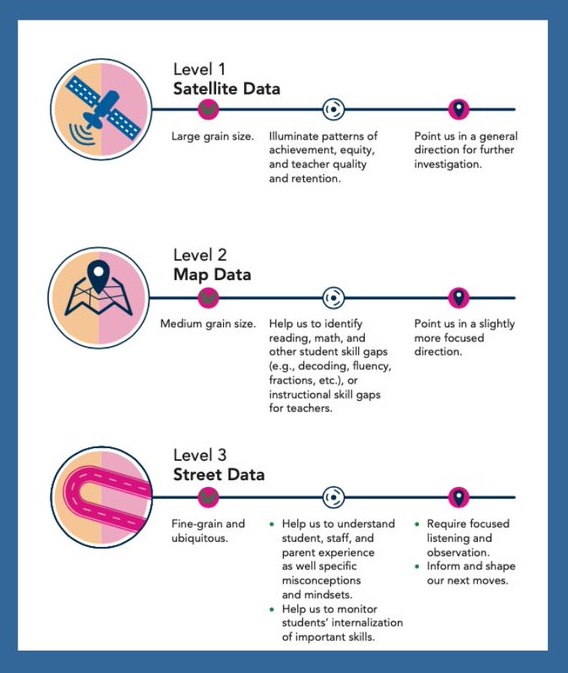
We are so privileged to be working with a cohort of school district and county office teams who are tackling these questions of “what data?” and “for what purpose?” as they look at their internal systems for reducing chronic absenteeism, improving access and outcomes for Black students, developing internal progress monitoring dashboards, and implementing the principles of Universal Design for Learning across their classrooms.
Join us as we continue to learn with them!
Data Dashboards: The Promise of Enhanced Data, Discussions, and Decisions

By Ingrid Roberson, Assistant Director of Research Learning
Data dashboards represent a significant investment in educational technology by districts and schools. Data dashboards promise enhanced data for real-time discussions and decisions by end-users, that is, educators. CCEE’s Data Research Learning Network (DRLN) includes three districts engaged in innovation journeys with the adoption and implementation of data dashboards.
The DRLN promotes the progress monitoring of data dashboards through user statistics, that is, map data that provides a more focused direction for inquiry and action. In August, Dr. Allan Taing and Dr. Nhi Hang conducted a User Statistics Workshop for DRLN districts, covering such topics as active vs. passive use measures, as well as web traffic measures (e.g. page views, total visits, length of stay, file downloads, traffic sources, etc.). The Measuring User Statistics: Tracking Engagement of Data Dashboards resource is a good example of tools shared with districts. All three districts are now progress monitoring data dashboard use on a monthly basis.
One example is Sanger Unified School District (SUSD). Assessment leaders are collecting and analyzing user statistics such as login counts, average logins, and percent of users logging in as a measure of uptake over the last three years. SUSD is complimenting this map data with street data by conducting empathy interviews with end users to better understand their experiences with data dashboards. Through a combination of map and street data, SUSD is customizing additional supports based on trends across the district, school, and grade-levels. Given the incredible amount of investment in Data Dashboards, DRLN districts, such as Sanger Unified, will be sharing lessons learned at upcoming conferences in November and December (see below for conference list).
The UDL Network
By James McKenna, Assistant Director of Professional Learning & Leadership Development

It’s no secret that the work of advancing equitable education opportunities for students is hard, lengthy, and often messy work. The opportunity to collaborate, share ideas, get feedback, and draw strength from a like-minded community can be a powerful force — for students, for teachers, and for school and district leaders. That’s why CCEE has expanded its support of learning networks to the work of implementing, and measuring the student impact of, Universal Design for Learning (UDL).
Working with partners in three state grant initiatives — the California Coalition for Inclusive Learning (CCIL), Open Access (OA), and Supporting Inclusive Practices (SIP), we have gathered three districts, diverse in demographics and geography but united in the pursuit of inclusive education for all. These districts are:
- Davis Joint Unified School District
- Nevada Joint Union High School District
- Poway Unified School District
Over the course of the 2023-2024 school year, these districts will examine problems of practice related to the implementation of Universal Design for Learning. Engaging in data-driven collaborative inquiry, they will implement initiatives to address these problems and take formative and summative data to monitor and evaluate impact. These indicators include benchmark assessments, student engagement, teacher efficacy, teacher practice, and more. We look forward to sharing their journey with you in our June summary report.
Using Street Data to Measure ROI of Statewide Professional Learning Initiatives
By Allan Taing, Senior Manager of Research & Impact Analysis

Program evaluations employ social science research methods to assess the design, implementation, and effectiveness of social programs (Rossi et al., 2019). In 2021, the state invested $75 million to establish three grant programs led by county offices of education to enhance the educator professional learning infrastructure within the Statewide System of Support. External program evaluations are embedded in these professional learning initiatives for learning acceleration, literacy, and open educational resources to support an innovative, rigorous, and analytical examination of these projects to determine the impact and effectiveness of these investments on educator practice and student outcomes. In other words, these program evaluations are trying to measure the return on investment (ROI) for these three projects.
The three program evaluation teams are moving into the second year of their evaluations, concluding their initial planning evaluations and moving onto formative evaluations for these projects. Investigating and determining the impact of these projects on educator practice and student outcomes requires a “Street Data” research approach. Measures of student impact — including results on the California School Dashboard — are satellite data answering the “what”. In addition, program evaluators leverage map data and street data through surveys, focus groups, document reviews, and observations, to answer the “why” and “how”. CCEE has created a Statewide Evaluation webpage to serve as a repository as program evaluation teams release their findings and recommendations.
To support program evaluation teams in this work, CCEE hosts bi-annual evaluation convenings to bring program evaluation teams, state agency partners, and other evaluation, program, and policy stakeholders and experts together to share findings, best practices, and lessons learned for ongoing development. The most recent evaluation convening on September 27 focused on developing a shared vision and common language across teams for evaluation approaches and methods for measuring student impact. Materials from this convening and prior convenings are available on the Statewide Program Evaluation Convening website.
Let’s Connect Beyond the Virtual Realm!
This fall, CCEE staff will be presenting at various conferences. If you will be attending any of the conferences below, we would love to see you there! Please let us know if you would like more information about any of these sessions.
| Conference/ Presentation | Session & Presenter(s) |
|---|---|
| California Teachers Association (CTA)’s 2023 Special Education Conference (October 6-8) | Foundations of Universal Design for Learning – James McKenna, Assistant Director of Professional Learning & Leadership Development |
| California Assessment Conference (CAC) (October 9-10) | Balanced Assessment Systems: A Case Study of One District’s Journey to Rebalance their Assessment System for Improved Student Math Outcomes – Ingrid Roberson, Assistant Director of Research Learning and Dorcas Kong, Sr. Specialist of Executive Projects |
| California’s Coalition for Adequate School Housing’s 2023 Fall Conference (October 12-13) | The Practice of Educating Very Young Children: Curriculum Drives the Built Environment – Julie Boesch, Assistant Director of the System of Support |
| Ventura County Superintendent of Schools (October 19) | Transforming Schools – Matt Navo, Executive Director |
| What’s Right in Education (October 24-26) | State and National Leaders Panel: Current and Future Trends in Education – Chris Hartley, Deputy Executive Director |
| 2023 Charter School Development Center (CSDC) Conference (November 8-10) | Shifting Mindsets, Changing Culture: Systems that Support All Students – David Toston, Sr. Advisor of Strategic Initiatives |
| 2023 California Educational Research Association (CERA) Conference (November 13-15) | Supporting Black Student Achievement: Lessons Learned from Year 1 of the African American Student Success Network – Sujie Shin, Deputy Executive Director and Italo Ciccarelli, Program Specialist Balanced Assessment Systems: A Case Study of One District’s Journey to Rebalance their Assessment System for Improved Student Outcomes – Ingrid Roberson, Assistant Director of Research Learning and Dorcas Kong, Sr. Specialist of Executive Projects Guiding Our Schools Forward: Best Practices For Districts Utilizing Assessment Dashboards to Improve Data Literacy and Target Student Supports – Allan Taing, Sr. Manager of Research & Impact Analysis and Nhi Hang, Program Specialist Amplifying Community Engagement for Continuous Improvement – David Toston, Sr. Advisor of Strategic Initiatives |
| Breaking Barriers Integrated Care Symposium (November 14-16) | Stories from the Field: Applying the Ecosystem Recommendations to Regional & Local Implementation – Chris Hartley, Deputy Executive Director and Mindy Fattig, Sr. Advisor of the System of Support |
| California School Boards Association (CSBA)’s Annual Education Conference (November 30 – December 2) | Data Dashboards: The Good, the Bad and the Ugly – Ingrid Roberson, Assistant Director of Research Learning and Allan Taing, Sr. Manager of Research & Impact Analysis |
| System Improvement Leads (SIL) Summit (December 12-13) | CA Statewide System of Support: It is Us (Opening/Keynote) – Mindy Fattig, Sr. Advisor of the System of Support |
External Evaluation Services for 21st Century California School Leadership Academy (21CSLA) Initiative
DESCRIPTION
Established by the Legislature in 2013 with the enactment of the Local Control Funding Formula (“LCFF”), the CCEE became operational in 2015 to “advise and assist” local educational agencies (“LEAs”) with achieving the goals set forth in their Local Accountability Plans (“LCAPs”). (Ed. Code § 52074.) CCEE is an integral part of California’s State System of Support, which is designed to build the capacity of LEAs to support the continuous improvement of pupil performance, address the achievement gaps between pupil subgroups, and improve outreach and collaboration with stakeholders to ensure that LCAPs reflect the needs of pupils and the community, especially for historically underrepresented or low-achieving populations (Ed. Code § 52059), the CCEE’s responsibilities have been updated to support this work.
The CCEE is requesting proposals for external evaluation services to provide both formative and summative evaluations of the activities conducted as a part of the 21st Century California School Leadership Academy (21CSLA) initiative within the Statewide System of Support.
The 21CSLA initiative was established by Senate Bill 75, Section 26 Statutes of 2019, which added Article 5 (commencing with Section 44690) to Chapter 3.1 of part 25 of Division 3 of Title II of the California Education Code (Click Here for Link).
Proposals Due Date: November 1, 2023 by 4:00pm PST
REQUEST FOR PROPOSALS (RFP)
QUESTIONS & RESPONSES (Post Date: October 20, 2023)
NOTIFICATION TO THE PUBLIC (Post Date: November 22, 2023)
Point of Contact: Jasmine Hennessy ([email protected])
Last Updated: September 27, 2023
Direct Technical Assistance Support
Posting Date: 9/22/23
DESCRIPTION
Established by the Legislature in 2013 with the enactment of the Local Control Funding Formula (“LCFF”), the CCEE became operational in 2015 to “advise and assist” local educational agencies (“LEAs”) with achieving the goals set forth in their Local Control and Accountability Plans (“LCAPs”). (Ed. Code § 52074.) CCEE is an integral part of the Statewide System of Support, which is designed to build the capacity of LEAs to support LCFF, through the continuous improvement of pupil performance, address the achievement gaps between student groups, and improve outreach and collaboration with partners to ensure that LCAPs reflect the needs of pupils and the community, especially for historically underrepresented or low-achieving populations (Ed. Code § 52059).
The purpose of CCEE’s Direct Technical Assistance (“DTA”) is to “advise and assist” county offices of education (“COEs”) and local educational agencies (“LEAs”) in need of targeted assistance in achieving their Local Control and Accountability Plan (“LCAP”) goals by effectively meeting the needs of students historically underserved. The DTA process utilizes school/district turnaround principles and quality improvement practices to effectively build the capacity of LEAs to support all students’ academic and social-emotional well-being. When CCEE provides this assistance to an LEA, their teams collaborate with external partners and professional content experts to create a culture of continuous improvement that addresses systemic barriers to teaching and learning.
In 2019, the statute outlining the CCEE’s mission (Ed. Code § 52074) was updated to designate school districts that receive emergency apportionments pursuant to specified provisions as being referred to CCEE, after which CCEE may conduct a systemic review of the district. CCEE may further coordinate and facilitate assistance to the district provided by governmental agencies in order to facilitate and provide coherent support.
CCEE also provides technical assistance to school districts that meet specified student performance criteria over a period of three out of four consecutive school years.
CCEE is looking for respondents who can support the partner LEAs in implementing State priorities. Further Information is included in the Request for proposal.
Proposals due: Friday, March 29, 2024 at 4:00pm PST Thursday, May 1, 2025 at 4:00 pm PST
Point of Contact: [email protected]
REQUEST FOR PROPOSALS (RFP)
QUESTIONS & CLARIFICATIONS
Hot Topics-Nishimoto Elementary Intensive Assistance Model
On August 31, 2023 the CCEE presented the year one overview of the Intensive Assistance Model (IAM) work with cohort I schools. The IAM is one of the most intensive coaching models in the country with over 150 days of on-site coaching in schools for English Language Arts, Mathematics, Assessment, Leadership and Professional Learning Communities. There are currently five school districts and eight schools involved in the model for cohort 1 (please click here to see list of LEA participants and CCEE’s role in Technical Assistance).
The CCEE governing board listened to the presentation by the CCEE and PACE (Public Analysis for California Education) regarding the progress of the schools in this model.
Slide 8 includes a video of Nishimoto Elementary in Madera Unified School District describing the work in year one.
The learnings from this model, even in just one year, are invaluable. They shed light on the exact nature and type of support educators require to refine their teaching methodologies and elevate student learning experiences.
Take Action Now!
🔗 Key Resources:
- Explore the entire presentation from CCEE and PACE
- Engage with the heartfelt video testimonial on slide 8 of the presentation, showcasing the bright and promising transformation taking place at Nishimoto Elementary.
- Watch the entire CCEE board meeting on August 31, 2023
- Stay Tuned for the comprehensive PACE Year I report unveiling soon, providing a detailed overview of the journey thus far.
Stay Ahead in Education! 📚 Check out our most recent Friday 5! Join CCEE’s ListServ & Calendar Updates to Never Miss an Event. Sign Up Now for Limitless Learning Opportunities. 🌟 #CCEEConnections”
Literacy: CCLA Statewide Community of Practice (CoP)
The intent of this Community of Practice (CoP) is to leverage the expertise of others, to gain knowledge and deepen understanding of learning acceleration in foundational literacy skills and reading comprehension utilizing evidence-based practices and elements of Universal Design for Learning (UDL), Social Emotional Learning (SEL), and Culturally Sustaining Pedagogy (CSP).
2023-2024 CCLA Literacy CoP Dates; Tuesdays from 3:30 – 5:00 PM
Session 1: September 19, 2023
Session 2: November 14, 2023
Session 3: January 23, 2024
Session 4: March 12, 2024
Session 5: May 14, 2024
INTENDED AUDIENCE: K-12 educators
(breakout sessions will consist of grade-alike groupings)
REGISTER: sccoe.to/2023-2024CCLALiteracyCoP
CONTACT: Rebecca Davidson | 408.453.4295 | [email protected]
The California Collaborative for Learning Acceleration (CCLA) in partnership with the California Collaborative for Educational Excellence (CCEE) and six County Offices of Education (COE) will be creating an inclusive space for collaboration and learning for educators across the state through this Community of Practice (CoP).
Mathematics: CCLA Statewide Community of Practice
The Mathematics Community of Practice (CoP) is a space for learning and collaboration. Together, we will leverage the expertise of each other to gain knowledge and deepen understanding of learning acceleration in mathematics utilizing evidence-based practices and the principles of Universal Design for Learning (UDL), Social Emotional Learning (SEL), and Culturally Sustaining Pedagogy (CSP).
2023-2024 CCLA Mathematics CoP Dates
Choose your 2023 Sessions:
Session 1: Tuesday, August 29 or Thursday, August 31 @ 3:30-5:00 p.m.
Session 2: Tuesday, October 17 or Thursday, October 19 @ 3:30-5:00 p.m.
Session 3: Tuesday, December 12 or Thursday, December 14 @ 3:30-5:00 p.m.
Choose your 2024 Sessions:
Session 4: Tuesday, February 27 or Thursday, February 29 @ 3:30-5:00 p.m.
Session 5: Tuesday, April 16 or Thursday, April 18 @ 3:30-5:00 p.m.
INTENDED AUDIENCE: K-12 educators
(breakout sessions will consist of grade-alike groupings)
FREE-REGISTER: sccoe.to/2023-2024CCLAMathCoP
CONTACT: Rebecca Davidson | 408.453.4295 | [email protected]
The California Collaborative for Learning Acceleration (CCLA) in partnership with the California Collaborative for Educational Excellence (CCEE) and six County Offices of Education (COE) will be creating an inclusive space for collaboration and learning for educators across the state through this Community of Practice (CoP).
